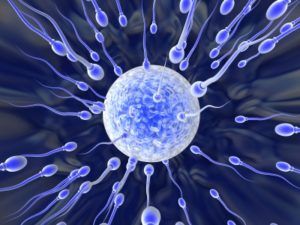Results: Forty-three (43) men, age 30-58 years, who were initially low in sperm count (<50 M/ml) or motility (<60%), and who had tried unsuccessfully to impregnate spouse for 6-36 months, completed the study. After 3 months, the supplement group (N=21) demonstrated an increase in mean sperm count from 23.2 M/ml initially, to 36.1 M/ml (55% increase, p=0.05). Motility increased from 29.6% to 39.5% after 3 months supplementation (33% increase, p=0.05). The treatment group also showed higher sperm linearity than the placebo group at 3 months (61.1 v. 52.6, respectively; p=0.04). The placebo group (N=22) demonstrated no significant improvement in any of these parameters. No serious side effects were noted.
Conclusion: This dietary supplement is an attractive option for use in the management and optimization of reproductive health in men, either by itself or as an adjunct to other fertility treatments.
Westphal L, Stanford Univ, Clin Res, 2007.
Introduction: There is a decline in male fertility thus new treatments are needed. Aims: To test the efficacy of a new dietary supplement developed in the USA and registered as a curing drug in Hungary (OGYI). Methods:In a clinical trial 100 men with low sperm quality (spermium count 5–20 M/ml, good motility 10–40%, and adverse shape 30–50%) were examined. Results: Sperm parameters were measured before and after a 3-month treatment and after another 3-month without treatment. This dietary supplement statistically and clinically significantly improved sperm count and motility. In 74 cases this dietary supplement demonstrated a beneficial effect on sperm quality (more than 10% increase in sperm count, or quality of motility, or shape); in 16 cases the improvement exceeded 30%. No adverse effect could be accounted for this treatment.Conclusions: This new dietary supplement may contribute to the treatment of male infertility.
Orv. Hetil., 2012,153, 1787–1792.
- Westphal L, Stanford Univ, Clin Res, 2007.
- Horvath MM, Czeizel AE, Orv. Hetil, 2012, 153,1787-1792


